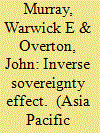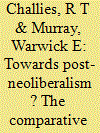| Srl | Item |
| 1 |
ID:
109469


|
|
|
|
|
| Publication |
2011.
|
| Summary/Abstract |
Theories and practices of international aid have stressed the need for the full participation of recipients. This approach has been strengthened by international agreements such as the Paris Declaration on Aid Effectiveness in 2005, which called for 'ownership' of development strategies by recipient agencies. This seemed to promise recipient governments an increased stake in the way aid was used for development and poverty alleviation. However, in practice, the new aid agenda has actually increased demands on recipients with new conditions over the management of aid funds, the setting of development strategies and the meeting of other global obligations. This issue is of particular concern in small Pacific Island states where the small size of government is coupled with increasing demands from donors for consultation, accountability and engagement to create what we argue is an 'inverse sovereignty' effect: despite the rhetoric of ownership and independence, recipient states are actually losing control over their development strategies, policies and programmes.
|
|
|
|
|
|
|
|
|
|
|
|
|
|
|
|
| 2 |
ID:
084433


|
|
|
|
|
| Publication |
2008.
|
| Summary/Abstract |
Abstract: This paper compares the evolution of the dominant politico-economic paradigm over the past 80 years in two 'resource periphery' nation states that have become 'models' of economic reform, New Zealand and Chile. Analysing the forces that have driven change, it traces the shared transition from a neoclassical model, through structuralist/Keynesian principles, and on to neoliberalism. The paper discusses whether the contemporary convergence around neostructural policy represents a paradigm shift or an adaptation of the neoliberal model designed to sustain free-market principles in a form that is acceptable to electorates. The paper concludes that the broad commonalities in the transitions are remarkable and come about as a result of shared external shocks as well as similar historical insertions into the global political economy. Notwithstanding the parallels, the comparative approach reminds us of the contingent unfolding of economic paradigms across space, a point that counters arguments that assert that neoliberalism, and the globalisation to which it gives rise, create a homogenous global political economy. This comparative study is timely, as the two countries have recently signed a bilateral strategic trade partnership. This agreement indicates continued pursuit of neoliberal agendas in both countries rather than, as respective governments have heralded it, a move to foster South-South cooperation.
|
|
|
|
|
|
|
|
|
|
|
|
|
|
|
|